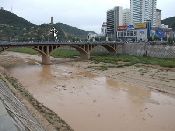|
The area and people
Land use in the Eskisehir Basin is unirrigated cereals, meadows, irrigated sugarbeet and sunflower and fruit cultivation. The area is 4th among the national league with respect to agricultural production per person.
Added value of DESIRE for stakeholders
Added value of DESIRE for stakeholders in the SS is the participatory approach. There is a low level of contact between stakeholders. Organization is poor and the workshops are a help to connect farmers with farmers and farmers with researchers. In the beginning of the workshop people did not see an added value of DESIRE.
There is a gender problem; women do not join workshops. One should work through village elders. People traditionally gather and discuss in coffee houses and tea houses. Could this be used to discuss degradation and land use?
Study site stakeholders workshops
3-day stakeholder workshops were organized. On the 3rd day the GO’s and NGOs were invited to participate. Half of them left during the day. Farmers are reached by the government through workshops that are advertised in local media such as TV and radio. Farmers complain that the market prices are too high, while the price at which products are bought by middlemen is low.
Limitations for spontaneous implementation of soil and water conservation practices
A limitation to the spontaneous adaption of new methods are investment costs and low level of contact between stakeholders limiting exchange.
Stakeholder groups
- Provincial Division of the State Water Affairs: The local branch of the primary executive state agency for elimination of adverse effects of Turkey’s surface and groundwater and putting them in public utilization in various ways such as hydropower, irrigation, domestic and industrial use. This institution is passively involved in DESIRE since it previously constructed the Keskin Dam in the study site area.
- Anatolian Agricultural Research Center: A governmental organization conducting various research activities including production of drought resistant new species, amelioration of meadows etc.
- Provincial Special Management: The older General Directorate of Rural Services, now bound directly to local governor. It is expected normally to distribute infrastructure services such as road and aqueduct building or repair, etc.
- Provincial Directorate for the Environment and Forestry: Local state branch responsible for reforestation and environmental rehabilitation and protection.
- Soil and Water Research Institute, Eskisehir Branch: Branch of an organization (The Ministry of Agriculture and Rural Service) aiming at the development, conservation or suitable exploitation of the soil and water resources in the Eskisehir region. This institute previously made some research projects in relation to various aspects of land degradation in Eskisehir regions.
- Eskisehir Osmangazi University, Faculty of Agriculture: As a state university, this organization realises both education (undergraduate and MSc) and researches on productivity and land degradation issues.
- TEMA Eskisehir Branch: A branch of Turkish NGO for combating soil erosion, for restoration and protection of natural habitats.
- Foundation For The Reinforcement of the General Directorate of National Parks and Game-Wild Life : A Turkish NGO focused on the protection of environment with its wild life.
- UNCCD National Focal point: The national connection point against desertification founded under the Research, planning and co-ordination board of the Ministry of Environment and Forestry.
- Tepebasi Municipality: Decision-maker and execution authority within the municipality boundary with respect to land management and related issues. Since the majority of the study site included within the municipality with the latest local legislative rearrangements, this organization has ultimate significance.
- Local Irrigation Unions: The union of villagers (end-users) for provision of surface and ground waters to their farms.
- Local Farmer Unions: The union of villagers for increasing the productivity of soil and and crop quality.
- Eskisehir Agricultural Credit Cooperation: An NGO that provides various agricultural credits to farmers.
Sustainability goals
The mountain villages (i.e. Uludere and Egriöz villages) of the study site still have significant number of cattle that frequents the pasturelands. For those stakeholders, increasing biological diversity as well as the amount of fodder production in pasturelands is the basic sustainability goal.
Dry croplands which are generally slightly to highly sloping actually undergo significant water erosion though neither farmer nor state organizations are financially capable of taking protective or mitigation measures. But they rather think of preserving or improvement of soil fertility as the major sustainability goal. For this reason they mostly prefer chemical fertilizers instead of mid-to long term soil preservation measures. Enlargement of forest cover and their maintenance and protection are viewed as fundamental sustainability goals by both farmers and state organizations. Lastly, optimum use of groundwater by any means in the irrigated croplands of the Keskin and Yukarisögütönü villages are adopted as principal sustainability goal by farmers of these villages.
The table shows the sustainability goals that were identified for the Eskişehir area.
| Goal 1 |
Increasing biological diversity |
| Goal 2 |
Improving productivity of fodder production on pasture lands |
| Goal 3 |
Conservation and improvement of soil fertility |
| Goal 4 |
Forest cover increase and maintenance |
| Goal 5 |
Efficient use of ground water sources |
Source: information from governmental organizations, farmer unions and expert estimate of the study site leader
|



